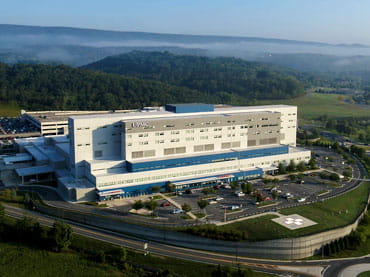When a stroke occurs, time is of the essence. It's vital to know the warning signs of a stroke and to seek treatment right away. At UPMC Western Maryland, we provide award-winning care to people who have had a stroke.
At UPMC Western Maryland, our experts work as a team to diagnose and decide the best stroke treatment. We use advanced therapies to treat stroke. Our goal is to restore cognitive and physical function.
Contact Us
It's crucial to seek treatment at the first sign of stroke by calling 911.
Call our stroke care coordinator at 240-964-1088.
The Stroke Program at UPMC Western Maryland
Stroke is the fourth-leading cause of death and the leading cause of serious, long-term disability in the U.S.
When something blocks or severely reduces the blood supply to part of your brain, it deprives brain tissue of oxygen. This is what causes a stroke.
For every hour’s delay in treatment, the brain loses 120 million cells. Stroke victims need treatment right away to lessen brain damage and other potential health issues.
Stroke Symptoms and Warning Signs
One in six people worldwide will have a stroke in their lifetime.
Common signs of a stroke are:
- Numbness or weakness of the face, arm, or leg, especially on one side of the body.
- Confusion, trouble speaking or understanding.
- Trouble seeing in one or both eyes.
- Trouble walking, feeling dizzy, or loss of balance and coordination.
- Severe headache with no known cause.
Getting treatment quickly for a stroke is crucial and can prevent disability and death. Don’t delay — call 911.
The B.E.F.A.S.T. test
If you notice any of the symptoms above, a quick way to check for a stroke is the B.E.F.A.S.T. test:
- Balance. Look for sudden balance loss or a change in the way they’re walking.
- Eyes. Ask if they can see out of both eyes or have any vision problems or loss.
- Face. Check for drooping on one side of the face or an uneven smile.
- Arm weakness. Ask the person to raise both of their arms. See if one arm slumps down or looks weaker than the other.
- Speech. Ask the person to speak. Check for slurred speech.
- Time. If any of the above seems out of the norm, call 911 right away.
Time is brain. Once a stroke happens, getting health care right away is vital to prevent further damage to the brain. Quick treatment can reduce complications and future disabilities.
About the UPMC Western Maryland Stroke Center
As a certified Stroke Center, UPMC Western Maryland proves that it meets the standards for prompt stroke care.
We’re also an American Heart Association Get With The Guidelines®– Stroke Gold Plus winner. The award recognizes our commitment to making sure our patients receive care based on the latest nationally respected research-based guidelines.
Our program offers:
- An acute stroke team on hand 24 hours a day, seven days a week. We’re experts at diagnosing and treating issues with blood flow and blood vessels in the brain.
- Written protocols to streamline and speed up the diagnosis and treatment of people who have had a stroke.
- Coordination of EMS personnel with emergency department staff.
- An outcome and quality improvement program.
- Education program for professional staff.
- Education on stroke recovery for you and your family.
Stroke Center team at UPMC Western Maryland
Our team will treat you or your loved one with care to lessen the lasting effects a stroke can leave.
Our neurologists are also highly devoted to the people in their care. They share on-call time to provide 24/7 stroke support and treatment.
The full stroke center team consists of:
- Neurologists.
- Neurosurgeons.
- Emergency medicine doctors and nurses.
- Imaging doctors and techs.
- Physical, occupational, and speech therapists.
Units within our stroke center include:
- Progressive care (PCU).
- Intensive care (ICU).
- Comprehensive inpatient rehab (CIRU).
After Discharge from the Stroke Center at UPMC Western Maryland
As a Gold Plus award-winning stroke center, we support you wherever you go after discharge.
You may be ready for outpatient physical therapy in our clinic. Or you may need more time to heal and qualify to continue inpatient stroke care in our CIRU.
While in the CIRU, you have all of the resources of acute care if needed and can receive:
- Seamless care from the same Stroke Center team of neurologists who treated you in the hospital.
- Up to 3 hours of occupational, physical, and speech therapy daily.
- Respiratory therapy.
- Medical care and rehabilitative nursing.
- Neuropsychology.
- Pastoral care.
- Diet and nutrition support.
After rehab, you may take part in a stroke support group, which meets monthly at UPMC Western Maryland.
Learn more about UPMC Western Maryland support groups.
Learn More About Strokes
Visit the UPMC Stroke Institute to learn more about:

















